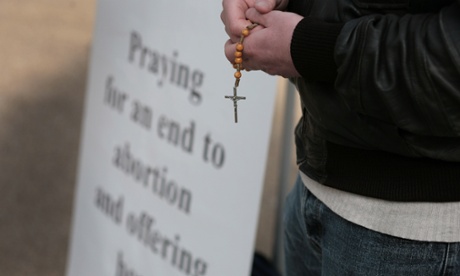If those who oppose abortions cared about women’s health, they would not spuriously link the procedure with breast cancer, or work to reduce access to life-saving health care

So Angela Lanfranchi is coming to Australia to speak at the World Congress of Families event. The baggage the American doctor is bringing with her includes not only speaker’s notes on her discredited presentation arguing abortion is linked with breast cancer, but also an anti-choice tradition of peddling this information out of a concern for women’s health, while playing down their theological or political agenda.
Lanfranchi will be representing the Breast Cancer Prevention Institute at the controversial gathering. Its website is worth a visit: there are pink ribbon symbols plastered over downloadable fact sheets that use some peer-reviewed articles that consider a possible link between the pill and breast cancer to proclaim that “the pill kills” – and that along with eating more broccoli and tuna, women should avoid abortions, have children as young as possible and only use natural family planning as contraception.
Broccoli and tuna at least seem like good advice. A medical “opinion” arguing that abortion increases your likelihood of breast cancer because – I kid you not – pregnancy makes your breasts grow and therefore creates more spaces for tumours to form, which they might if something-something-unclear-about-hormones isn’t sorted out by pregnancy, is something of an admission that the institute’s priorities on this issue do not appear to include much peer-reviewed science.
It’s not the only claim that anti-choice organisations are willing to make. Organisations with names like Life News may purport that studies confirm women face depression after abortion, but peer-reviewed scientific journals such as Obstetrics & Gynecology have confirmed that abortion is “not a statistically significant predictor of subsequent anxiety, mood, impulse-control, and eating disorders or suicidal ideation”.

Concerns for women’s health are the pretext used by anti-choice legislatures in the United States to demand that abortion providers confirm to the standards of ambulatory surgical centres – standards that require clinics to be remodelled in near every capacity, from the spacing of hand-sanitisers to the flooring of cleaner’s closets.
The expense in adopting such clinical standards, as well as additional demands (like those for clinics to meet “admitting privileges” with hospitals within a 30 mile radius), makes reproductive health provision in remote and regional areas very difficult. In the state of Texas alone, it has led to the closure of 21 out of the 44 clinics that existed in 2011, with predictions of a further 15 to close by year’s end. These closures are not merely denying women abortion procedures but also the removal of the kind of local reproductive health provision that detects cancer, treats infections and diseases and, you know, keeps women alive.
It’s easy, facetious and truthful to remind the likes of Lanfranchi that if women’s health is her number one concern that she’d be better to advise women to have abortions rather than proceed with pregnancy: studies confirm that full term pregnancy and delivery carries a rate of 8,8 deaths per 100,000. The risk of death from complications to abortion is 0,6 in 100,000.
This is, of course, until abortion services are restricted from what is legal, medical and safe – and already, in the US, the anti-choice measures above are returning women to the unsafe abortion practices of yore. In Texas, the back-alley abortion is back; research teams from reproductive health organisations are hearing “reports of women taking herbs or other substances, or intentionally getting punched in the stomach or beaten up – the same kinds of things they did before abortion was legal” in the wake of the new laws. Reportedly, “emergency rooms are suddenly seeing more women suffering from miscarriages – bleeding because they took pills to end their pregnancy, outside the of the supervision of a doctor… Some women are throwing themselves down the stairs or asking their significant other to punch them in the stomach.”
And the worst part is, the threat to women’s health from a lack of safe abortion service provision is known, provable, quantifiable. Where abortion is legal it is usually safe, but where it is restricted it is unsafe; studies published in The Lancet show that highly restrictive abortion laws are not associated with lower abortion rates, and the World Health Organisation reported 47,000 deaths from unsafe abortion in 2008. And these are real people, not spurious ones to purport questionable claims about breast cancer.
What it gets down to is what it has ever been: if you don’t want an abortion, don’t have one. If you are a doctor and you don’t wish to perform an abortion, use your right to conscientious objection and refer your patient to someone else. If your political or theological objections to women making their own reproductive choices are so strong they keep you up at night, you are entitled to engage in debate in dedicated political or theological fora.
What you are not entitled to do is mislead women and the public in an ongoing campaign to harass, coerce and interfere with personal health decisions that have nothing – nothing – to do with you.
